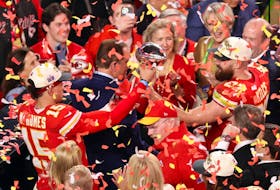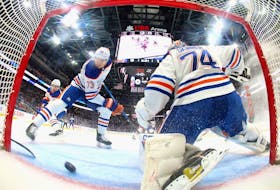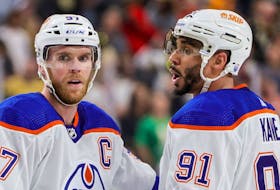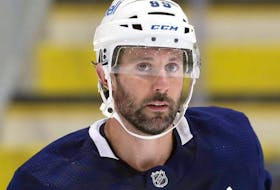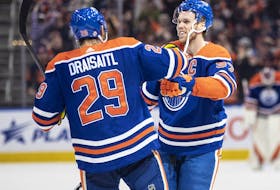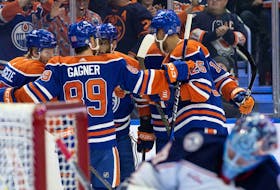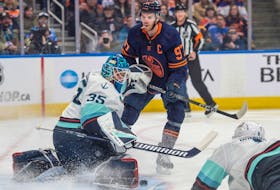EDMONTON — In the aftermath of the Canucks’ Game 1 loss to the Minnesota Wild, Bo Horvat’s post-game message was simple.
“Not to worry,” he said. “This is a long series.”
And just in case you missed his point, he repeated it.
“It’s a five-game series for a reason. It’s far from over.”
Still unconvinced?
“Like I said, it’s a long series,” he said.
So we heard.
If the Canucks, in fact, had shown the same determination getting to the Wild net that Horvat demonstrated in making his point, today’s conversation would be a lot different. But with all due respect to the Canucks’ captain, the qualifying round isn’t a long series. It’s a very short series and if the Canucks don’t find some urgency in their game Tuesday night, it will be even shorter.
In losing the first game of their play-in with the Wild, the Canucks immediately find themselves facing intimidating odds. In the history of best-of-five series, the team that’s won the first game has gone on to win the series 82 per cent of the time.
That’s worrisome enough. But for the Canucks the larger problem concerns their opponents, a veteran, battle-tested Wild team that gave the relatively young, relatively inexperienced Canucks a comprehensive lesson in playoff hockey.
Pretty it wasn’t. Effective it was, as the Wild parlayed two power-play goals, starring turns from a couple of their veterans, a bend-but-don’t-break team defence and contributions throughout their lineup to a 3-0 win.
“They’re a good team,” said Canucks coach Travis Green. “You have to give them credit. They know how to defend. It’s not like we spent a lot of time in their zone. We didn’t get to the net enough and we didn’t get enough shots.
“You have to scratch and claw to get there. It’s a learning process. You can talk about playoff hockey but until you play it, it’s not easy to get to the net. It’s not easy to score goals.”
That much has become obvious.
In the post-game forensics, fingers were pointed at the Canucks’ young stars and their failure to generate meaningful scoring chances. There was something to that. For many of the Canucks, it was their first exposure to the relentless demands of playoff hockey and the scoreboard suggested they failed their first test.
But this wasn’t all on the kids. On this night, there was plenty of blame to go around.
The Canucks directed 28 shots at Wild goalie Alex Stalock, including 24 over the first two periods. But 17 of those shots came from their blue-line, just four shots were produced over the final frame and their top six generated just six shots with Tanner Pearson, Tyler Toffoli and Horvat failing to produce a shot among them.
It was also telling that Green went out of his way to laud the performance of Elias Pettersson on Monday while declining to comment on the play of some of his vets.
“I thought Petey was fantastic,” said Green. “You might say, how can Petey be fantastic when he didn’t get a point? But his compete level was very high. Obviously he’s a guy other teams are going to key on and he embraced it. We talk about that as a group, wanting to be in that heat, wanting to be in that battle, and I thought he was a good example of that.
“A lot of our younger players showed a lot of heart and grit. They just weren’t rewarded for it. If they do that again, I’m sure they will win.”
The Wild, however, will have something to say about that.
In taking Game 1, Dean Evason’s team didn’t offer any surprises but they went about their game with a grim sense of purpose. It helped that Kevin Fiala’s power-play slapper went through Jacob Markstrom, giving the Wild an early lead. But the Wild’s balanced, structured team game was the difference on the night.
Evason, the first-year head coach, rolled four lines and concentrated the blue-line minutes among his formidable top four: Ryan Suter, Jared Spurgeon, Jonas Brodin and Matt Dumba. The result? Fourteen Wild players played at least 14 minutes, Spurgeon was the scoring star with a power-play goal and an empty-netter, and Stalock, the career backup making just his second-ever postseason start, recorded a stress-free shutout.
“We weren’t flipping lines off and on,” Evason said. “We were just asking everybody to compete when they were out there against certain people. Our group committed to that.
“The defence pair is more important to us.”
The Wild also benefited from four straight power plays that had something to do with team discipline and something to do with what referees Kelly Sutherland and T.J. Luxmore were and weren’t calling.
“That’s part of the game,” said the Wild’s Ryan Hartman. “It’s hard. It’s gritty and it’s difficult to play if you’re not ready for the test.”
Green, meanwhile, suggested he’s considering lineup changes for Game 2, and he has options among his forward group. But whoever draws into the Canucks’ lineup, their assignment will be as clear and uncomplicated as the challenge facing the team.
Find a way to be better. Find a way to win. It’s as simple and complicated as that.
“Short memory,” said Horvat. “You have to forget about the past and focus on the next day, the next game. That’s how it works in the playoffs.”
At least it does if you want to turn this into a long series.
CLICK HERE to report a typo.
Is there more to this story? We’d like to hear from you about this or any other stories you think we should know about. Email [email protected] .
Copyright Postmedia Network Inc., 2020

